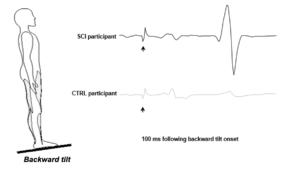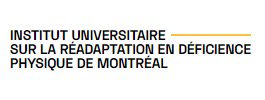Alteration of H-reflex modulation underlies impaired postural responses in individuals with incomplete spinal cord injury
 Individuals with incomplete spinal cord injury (iSCI) are at higher risk of falling, even after intensive functional rehabilitation (Brotherton et al., 2007; Amatachaya et al., 2011). This risk of falling is due to decreased balance control, particularly impaired postural reactions – body reactions that help to regain balance. In this study, we assessed changes in the postural reactions and in the modulation of the soleus H-reflex following perturbation of the base of support in individuals with iSCI, and we found that: 1) the modulation of H-reflex amplitude following perturbation is decreased and delayed in iSCI group; 2) impaired H-reflex modulation is coherent with larger CoP (centre of pressure) displacement and later EMG responses onset; 3) the decreased modulation of H-reflex is correlated to balance deficits and gait speed. Together, the results of the present study indicate that despite good functional recovery as measured by clinical tests, deficits remained in the modulation of spinal excitability, assessed by SOL H-reflex amplitude, following a sudden perturbation. These deficits are likely to put the individual at higher risk for falls.
Individuals with incomplete spinal cord injury (iSCI) are at higher risk of falling, even after intensive functional rehabilitation (Brotherton et al., 2007; Amatachaya et al., 2011). This risk of falling is due to decreased balance control, particularly impaired postural reactions – body reactions that help to regain balance. In this study, we assessed changes in the postural reactions and in the modulation of the soleus H-reflex following perturbation of the base of support in individuals with iSCI, and we found that: 1) the modulation of H-reflex amplitude following perturbation is decreased and delayed in iSCI group; 2) impaired H-reflex modulation is coherent with larger CoP (centre of pressure) displacement and later EMG responses onset; 3) the decreased modulation of H-reflex is correlated to balance deficits and gait speed. Together, the results of the present study indicate that despite good functional recovery as measured by clinical tests, deficits remained in the modulation of spinal excitability, assessed by SOL H-reflex amplitude, following a sudden perturbation. These deficits are likely to put the individual at higher risk for falls.





